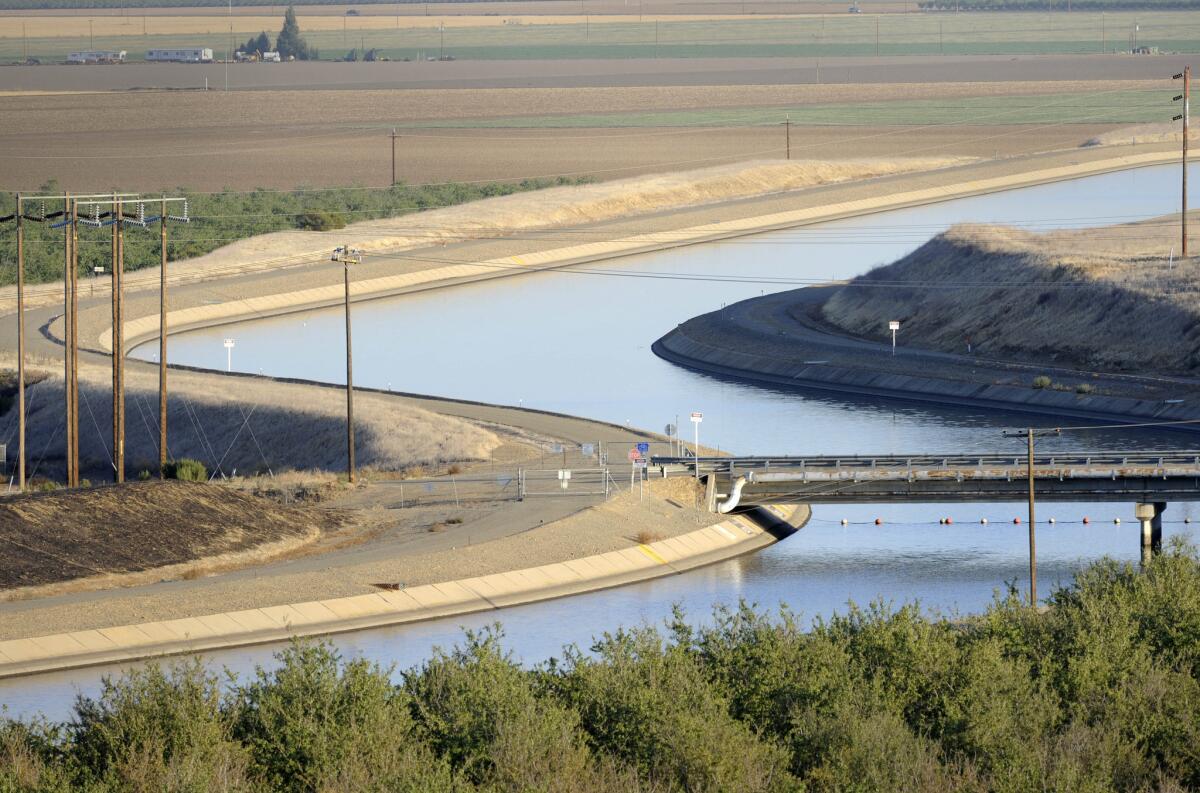California’s largest water district, accused of misleading investors, settles with the SEC

Westlands Water District canals in California’s Central Valley, photographed in 2009.
- Share via
A sprawling Central Valley water district run by some of the state’s wealthiest growers papered over its drought-related financial struggles and misled investors, federal regulators said Wednesday.
The Westlands Water District shifted about
$8.3 million in expenses and other obligations to the revenue side of its ledgers, solely to be able to represent that it had enough revenue to cover debt payments on $77 million in bonds without having to raise rates, according to the Securities and Exchange Commission.
The district’s general manager, Thomas W. Birmingham, jokingly called the moves “a little Enron accounting,” a reference to the defunct Houston energy and commodities conglomerate whose fraudulent accounting led to its spectacular collapse in 2001, according to the SEC. Birmingham agreed to pay a $50,000 penalty, and the district paid $125,000 to settle the case. The former treasurer, L. David Ciapponi, paid a $20,000 penalty, according to the agency.
“The undisclosed accounting transactions, which a manager referred to as ‘a little Enron accounting,’ benefited customers but left investors in the dark about Westlands Water District’s true financial condition,” said Andrew J. Ceresney, director of the SEC enforcement division. “Issuers must be truthful with investors, and we will seek to deter such misconduct through sanctions, including penalties against municipal issuers in appropriate circumstances.”
Neither Westlands nor its administrators acknowledged guilt, and the district did not miss any bond payments, according to a statement issued by the district. The accounting procedures at issue were approved by an independent auditor, according to the district.
“Westlands, Birmingham and Ciapponi determined that entering into the settlement to fully resolve the matter was in the district’s best interest,” the statement said.
At issue was a “debt service coverage ratio,” a measure of the district’s ability to meet its debt obligation. Because of the district’s “extraordinary accounting procedures,” that figure was 10 times higher than it would have been using conventional accounting procedures, the SEC said.
That calculation obscured expenses incurred because of water cutbacks prompted by the state’s drought and allowed the district to avoid raising rates to its clients, which include some of the biggest agricultural companies in the state, according to regulators.
Stretching about 70 miles along the western side of the San Joaquin Valley, Westlands is one of the chief supporters of a $15-billion plan to build tunnels under the Sacramento-San Joaquin River Delta to bring more water directly from the Sacramento River southward.
The SEC violation added vigor to charges by critics of the project that the state’s growers will be unable to shoulder its costs.
“This could put the financing for the tunnels at risk,” said Patricia Schifferle of the environmental group Pacific Advocates.
Schifferle said she filed a complaint with the SEC in 2011, and last year sent the agency minutes of a 2010 Westlands finance committee meeting, obtained through the Public Records Act, that discussed the debt ratio and revenue shortfall.
“I thought it was going in the round file,” she said. “Maybe they finally took a look at it.”
A public agency governed by landowners within its borders, Westlands had operating revenues of more than $120 million in 2014. It contracts with the U.S. Bureau of Reclamation for taxpayer-subsidized irrigation supplies, which it sells to growers.
The district includes about 600,000 acres and is entitled to more than 1.1-million acre feet of water annually, roughly twice what the nearly 4 million residents of Los Angeles use in a year.
Reductions in that water supply, and the cost of replacing it, meant the district could not generate enough revenue to meet the debt service ratio required to maintain its bond rating, which helps reduce the cost of borrowing money. Fitch gave the bonds a rating of “AA-”
The district looked at its books and consulted its auditor to find ways to boost its revenue, at least on paper.
“We’re not collecting any more money from the ratepayers, nor are we paying any more money” to service debt, Birmingham told a Westlands customer during a board meeting in 2010, according to the SEC.
The district reclassified reserves originally earmarked for future expenses, including obligations to the Bureau of Reclamation, the agency charged.
“These reclassifications would not increase cash collections and were merely accounting transactions done for the sole purpose of maintaining the ratio,” the SEC said.
Two years later, the board made other adjustments “to create additional purported revenue” without reporting their effect on revenue or on its bond ratio, according to the SEC.
Times staff writer Bettina Boxall contributed to this report.
More to Read
Inside the business of entertainment
The Wide Shot brings you news, analysis and insights on everything from streaming wars to production — and what it all means for the future.
You may occasionally receive promotional content from the Los Angeles Times.











